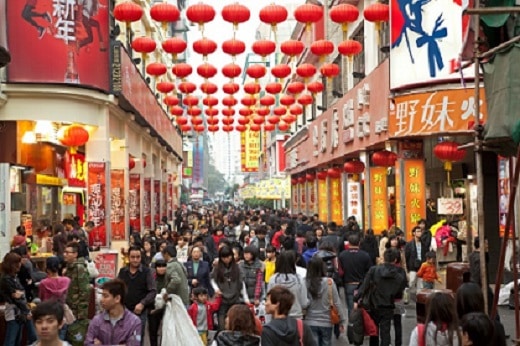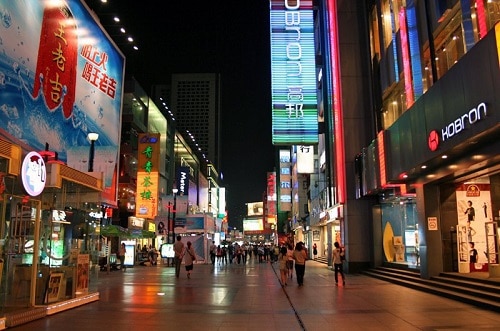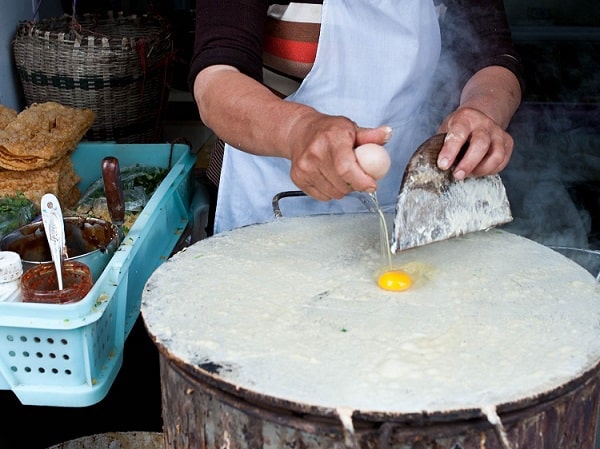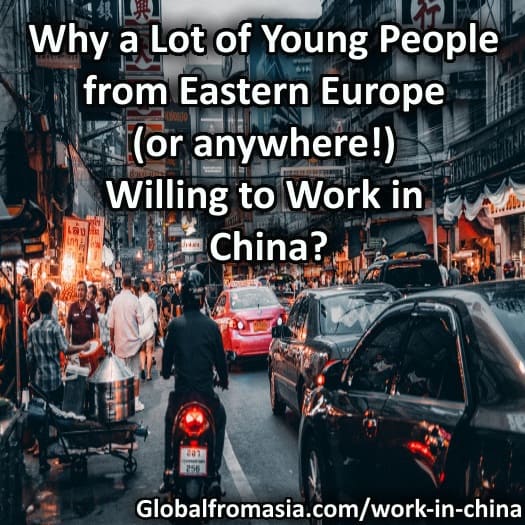
Life does not seem exciting if you don’t challenge yourself and take risks. This is why you need to step out of your comfort zone if you want to achieve something in life. Young people are always looking for attractive job opportunities for their future. Traveling overseas is one of the most important decisions that can help you secure a better financial future and build a promising career.
When it comes to career opportunities and chances to secure a promising position, Chinese labor market beats them all. In 2016, average level of unemployment reached 4.5% in big cities, which is surprisingly low. Asian region remains the most proliferating sector in terms of economic growth. That affects employment levels correspondingly – demand for qualified personnel is constantly high, and it is not going to decrease any time soon. No wonder people all over the world are attracted to try themselves as Chinese citizens; level of well-being there is a catchy fascination for those who were born in not so developed countries.
Many young people from Eastern Europe are trying to find work in China – one of the most appealing recruitment destinations. There are a lot of job opportunities with great compensation packages that usually interest young people especially those who are coming from Eastern Europe. Although this region is economically active, statistics about the labor force and average employment rate is drastically lower if compare with Asia, especially – China. Unfortunately, European region provides less job openings, as well as lower wages (in correlation with the prices for a living and income-to-outcome ratio). All of these factors combined together can easily explain the expansion of migrants to China that only boosts every year.

The Chinese Boom
The Chinese economy is one of the fastest growing economies in the world. There are a lot of great businesses that choose to operate in China because they spend noticeably less money on operation than anywhere else in the world. This creates more interesting job opportunities that attract qualified individuals from all over the globe. Add to this China’s leading position in many fields, like most recent information technology (including artificial intelligence and augmented reality exploring), software development, robotic startups, and many more. Where should go a skilled and ambitious young professional? Most likely, he/she would choose a country that is welcoming in terms of legal, social, financial, and employment matters. For now, China has it all.
Young people from Eastern Europe prefer to work in China because there are less economic restrictions. Obtaining the Chinese visa is quite easy, comparing to American visa for example, and getting the legal work is straightforward. This is a great plus for young people who are trying to work overseas and usually face problems while finding a job in the USA and EU.
Chinese Visa Issue

First and foremost thing that has to be planned by young people who want to transfer to China and start a career there is getting a Chinese visa. This procedure differs from country to country, but the initial steps are pretty much the same regardless of location. To get a visa, a person has to contact the Chinese Embassy in the country where he/she lives. In case there is no such establishment, you can always refer to a third party firm that hires consultants from Asia and guides applicants on getting the needed pack of documents. Such companies are basically the Visa Application Service Centers, and they can help tourists and working emigrants to gather all the papers required for any country.
Keep in mind that preparing a visa comes with additional charges you have to pay at embassy or application service center. Prices will depend on the type of visa you are trying to get, for example, a one-entry tourist visa will cost less than a worker one. Another crucial moment is that in case of rejection, you will get your money back. Most common types of entrance document include:
- Tourist visa (also called Chinese L Visa) – this type is suitable only if you would like to visit a country for a relatively short period of time and have no intention to work there. It is a great option to find out whether the local culture and lifestyle would fit your expectations. Also, by visiting a few cities yourself, you can choose your future destination in terms of settling down.
- Business M visa – do not confuse business and work visas; these are drastically different from one another. A business one is suitable for people who conduct a lot of trips and professional meeting in China but have no intentions to live there permanently. It can be obtained for ten years, but the thing is you can’t stay in China longer than for a few months without crossing the border.
- Employment visa (another common name is Z Visa) – this document is the most desirable for Chinese migrants. It is sometimes titled Foreign Expert Certificate (FEC). To get it, you have to already possess a potential employer at your disposal. Representative of the company that is hiring you should confirm the job offer for the embassy, which later will proceed with the visa release. This type of document is the hardest to get out of the rest. There are even some requirements for age, professional qualifications, education, and health. Meaning, a person that is about 60 years old, has some health issues and does not possess any unique expertise has almost no chance of getting a worker invitation to China. Nevertheless, young professionals are much more welcomed. This kind of visa requires an update every year.
Finding a Job in China
China is a big country with millions of job opportunities. The job market doesn’t dismiss any nationality which is a great plus if you are coming from Eastern Europe. No matter what your field is, you can still find a good job opportunity if you contact a qualified China recruitment agency. They will study your application and match you up with various employers who are looking for your expertise.
A lot of international companies choose to operate in China because of the favorable economic status. The country is creating a welcoming environment that encourages investment and investors. With lower taxes, companies are able to make more profits.
If you are trying to get a job in China, you need to make sure that your application will stand out. It is even a good idea to study and work there, as this will enable you to land better job opportunities. So if you will need help with essay writing try to find someone who will help you with that.
Although you can find literally tons of job openings in any area of interest, Chinese labor market has certain jobs popular among Eastern Europeans, especially younger generation. The list of the most popular career options is as follows:
1. English language tutoring
Let’s start with the most profitable industry – teaching jobs. English language is highly appreciated in China, since not that many residents are able to speak in it, or at least read. If you have learned it somehow – we are ready to congratulate you! You can easily earn as much as $5,000 monthly. Add to this flexible schedule, easy-going working process, and constant communication with new people around you that will widen your horizons and award you with new opportunities in life! Sounds like a dream job, doesn’t it?
To be a successful English teacher, you have to develop a certain syllabus, which you can later arrange in accordance with needs of every new student of yours. Saturate your lessons with visual material, dynamic exercises, and audio practicing. These components will help learners to keep their attention on the lesson’s subject. You can teach kids or adults, instruct private tutorials or group classes. The price for each kind of teaching will differ.
2. Build a career in the entertainment industry
Another popular and rather profitable part-time job belongs to entertainment field, which offers a wide variety of positions: host of events or celebrations, actor, go-go dancer, cheerleader, etc. This is short-term employment, meaning you could be hired as a for a single day. Such a job awards a person with a lot of opportunities! From having a great and fun time to meeting celebrities at big events and expanding your potential customer base.
This type of career does not require hard skill, which is another advantage for youngsters. All you have to possess include charm, communication skills, public speaking, charisma, and some talent like dancing/singing/acting. When try yourself if not after landing in another country?
3. Personal trainer
This is an amazing opportunity for athletic people. If you are into sports, staying motivated for you has never been a problem, and you know the basics of healthy nutrition then try yourself as a fitness trainer at your local gym. You can collaborate with the gym, or work as a freelancer, meaning that a particular person who needs your services would hire you. Duties of a coach include supervising a client during workouts, teach him/her athletic techniques, and develop a plan of gym sessions. Most experienced trainers also can add nutrition supervision to these.
4. Modeling
Modeling job is another example of a short-term job that you can get for a day or week (at max.). The only thing – you have to meet the requirements of a hiring person in terms of appearance, height, weight, and overall look. If you have passed casting, then you can make decent money from one event. European type of appearance – light complexion, big eyes (especially light blue or green) has massive popularity among Asian people, so European migrants have high chances to receive tons of job offers just because of their looks.
5. Freelance writing
Those who possess strong writing skills can easily make a fortune just using their laptops. There are tons of platforms that hire talented writers worldwide: Upwork, Freelancer, Edu Birdy, etc. Pros of this kind of employment are flexible working hours, a wide variety of topics (you can choose what to write about, from “Tips to fly China cheap” to “Racial discrimination at workplace” or any other topic you could only imagine), and high revenue per page.
What makes writing a great career job choice for people arrived from Europe is that they can share their valuable knowledge about European lifestyle and culture. Cross-cultural topics are extremely popular in media, and those who have changed regions always have something to say on this matter.
6. Waitering
This might be not the most attractive one, but at least it is a stable job that is always in high demand. In China, visitors do not give tips to waiters, which differentiates this country from the vast majority of other countries in the world. However, this does not mean that waiters there cannot make ends meet – it is not the case whatsoever! This job goes with decent salary that allows young people to live the life they deserve. Waiters also polish their communication and multitasking skills when working.
People frequently view service jobs as temporary and not very promising positions. However, if an employee manages to impress the company with his or her dedication and effort, managers would be more than glad to offer a promotion to such a worker. Restaurant and hotel industry in China provides great wages, comfortable working conditions, and growth with almost no limits.
7. Babysitting
Chinese baby boom is not new to anyone, therefore skilled babysitters are always welcomed on the labor market. In addition to making some money, you can get new friends, as you will be helping a family to bring up their kids, which is a priceless contribution to their lives. Also, when babysitting, you can manage to do your homework for university or college if you are currently studying, or do any additional activity of your choice.
Although these are the most common job titles hold by emigrants, in reality, your choice is way wider than this list. A person who has a non-standard qualification, for example, narrow scientific expertise in biology or chemistry, or, for example, an architect with a proven track record of buildings in a certain style, has amazing career prospects in China. If you are a youngster who is not yet certain about what to do for a living, do not be afraid to embrace your hobbies and turn your passion into a job. For example, if you are good at drawing, you might try to pursue a career in a design field. Being it web or fashion branch of design, Chinese labor market will award you with multiple offers. This is also more than valid when it comes to technology-related professions. Engineers, web developers, analysts – these are highly appreciated by Chinese companies as well, especially those who operate globally. By hiring employees with diverse cultural background, market giants assure the accurate and appropriate delivery of their services or products worldwide.

Living in China
Most jobs offer great bonuses in addition to the attractive salary. This includes free accommodation, paid vacations and even food allowance. Most people, who get jobs in China, can save a big percentage of their salaries because of the low cost of living. The way social life in China is arranged provides plenty of options for saving money. In fact, spending money wisely is a common feature for most of the Asian people.
If you are not located in the capital, but a rather small town or province, your incomes would be relatively lower comparing to wages of employees operating for market giants in megapolises. However, this also means that you’ll have less spending: no expensive public transport, more affordable restaurants, and grocery stores, etc. Life in China is very balanced when it comes to income-outcome ratio, and that factor is crucial for European people. Why? Because financial situation tends to be the opposite there, in particular in countries that are only developing their economy. Average salary in Eastern Europe is not enough to secure the social position of a middle class. It is simply not enough for paying rent, taxes, bills, buying decent food (giving the preference to organic products), clothing (and we are not even talking about high-end brands), and save some cash for things of higher importance like car, house, or at least comfortable vocation. So, it is not at all a wonder that citizens are seeking more countries with more stable economy and prices that correlate with salaries. Asian region is definitely one of them.

Image source: study china abroad .com/files/2016-03/chenngdu-nightlife.jpg (now offline)
The society is increasingly tolerable towards various nationalities and religions. This means that you won’t be dealing with cultural or religious tension that people usually face in other places of the world. Today, European countries like France and Germany are known for being tolerant of all the massive religions existing, races, sexual orientation, lifestyle, etc. At least, as far as it does not insult people around you – you can totally feel free about who you are and how you behave. Well, atmosphere in the Eastern part of Europe is not that welcoming so far. People there have certain historical background, influence of Soviet Union politics, in particular, that still has its place in minds of citizens. Subcultures are not appreciated, and the vast majority of citizens tend to mute their unusual personalities rather than promote them. That is what drastically differs China from the rest of the world – there, you have total control over your behavior without thinking of your public image. People of all body shapes, complexions, and styles feel freely and comfortably in China, mostly for two reasons: #1 – Chinese citizens are very open-minded when it comes to exploring new cultures, and #2 – rapid speed of life in most cities there makes people too busy to overthink how other people look and behave.
However, such a modern mindset in younger population does not mean that Chinese citizens disregard their traditions. Traditions have a decent value there and even serves as a basis for Asian personality. If you have never conducted a professional meeting that involved the presence of a Chinese man or woman, than their behavior at workplace might surprise you. And not a bad way; but it is something that is definitely worth discussing. You should be aware that these people never demonstrate their affection in public since this is considered as something inappropriate. Same goes for maintaining eye contact while speaking or hugging – you will not notice a businessman from Shanghai or other city performing these actions. Actually, it took years for Chinese people to get used to shaking hands. Now, it is totally fine and supported, but years ago, even this innocent gesture was misinterpreted there. The thing is that in China, people are very careful when it comes to entering someone’s personal space; this has been always associated with intimacy and way closer relations than professional atmosphere at workplace.
Another tradition that is common for every Chinese person with almost no exception and regardless of age, sex and social status is the importance of family. Family is a top priority for everyone there. You might have thought that it is a usual thing for any culture and region, but in China, this importance is especially embraced. Family units there are known for their loyalty and solidarity; for example, if you have found out a politics preferences of your colleague, you can be sure that his wife, parents, siblings, and kids have the same views.
Interesting Life

Living in China is fun. China is the land of amazing history with a lot of interesting places to visit. If you are interested in history and culture, you definitely won’t be bored. Thousands of years ago, China had a rich culture that excelled in arts and science. You can still visit those historical places to learn about amazing China’s past. Our personal top of must-visit places there includes Kashgar Bazaar in Xinjiang, Forbidden City in Beijing, Shaoshan in Hunan province, The Mogao Caves in Western China’s Gansu province, and the Great Wall, of course. If you are a newcomer in this culture, visiting these touristic sites will give you a clear image of its peculiarities. Bright colors and magnificent forms are combined with modesty and modernity – this is what Chinese architecture (and overall image of beauty) is about.
The Chinese language might not be very easy, but you can still learn it. Most jobs offer discounted Chinese language courses for people who are moving to China. This definitely allows them to feel more adjusted to the Chinese society. As they learn the language, they are becoming more involved in various social events. Although other languages are appreciated there in terms of employment and high salaries, immigrants have to keep in mind that local population does not speak foreign languages. In big cities, there are some chances to meet a person who would speak English at some level, but once you reached suburban area – Chinese is the only language of communication there.
Another aspect of language learning is that Chinese differs from province to province. The basics remain the same at most, but if you would like to avoid miscommunication and language barrier (in this case, a term “dialect barrier” would be more accurate) than go to the province, you would like to settle down in and polish your speaking skills there.
Chinese culture cannot be viewed apart from its special cuisine. Food there is a fun experience, from cheap street options to luxury restaurants. Of course, you will find things that you never thought about trying before. But you can still find your usual Western brands that offer the fast food you are accustomed to. Although an initial look at Chinese dishes might leave you confused, cuisine there is actually balanced, quite healthy and delicious. It consists not only of rice and noodles, as you might think. People there really enjoy eating vegetables, various kinds of meat, fish, and seafood. Preparation ways are also diverse, although if judge by street food – you may think that Chinese food is mostly deep-fried. This is not the case for meals people consume on a daily basis. Vice versa, they prefer healthier options like boiling and steaming.
Most popular and typical dishes that Chinese consume daily include:
- Gaifan. Basically, this is a bowl of rice, usually boiled but it could be fried as well, that is served with some kind of topping of your choice. This might be vegetables, tofu, fried egg, any kind of meat, seafood, fish, etc. The price is relatively low, however, it differs depending on your topping preferences.
- Miàntiáo. This mystery words stand for noodles. No matter what your country of origin is, you have probably tried some version of Chinese noodles anyway. This is the most popular lunch option for the whole country. Chefs there make noodles of various key ingredients, like wheat, rice, and buckwheat. Toppings are also diverse – from meat, sausages, bacon to vegetables, tofu, and various seafood species.
- Baozi. These are tiny steamed buns with a stuffing inside them. The most traditional stuffing is pork, but you would easily find vegan-friendly options as well.
- Jiaozi. Jiaozi are stuffed dumplings that are traditionally prepared with steam, but you can request the chef to fry them for you if wanted. This meal is very popular due to its low price and accessibility – you can buy them almost every ten blocks in big cities like Shanghai.
- Malatang. This dish is a hot spicy soup, a very popular choice for lunch amongst most Chinese citizens throughout the country. It is served as a bowl filled in with broth and various ingredients like meatballs, little sausages, tofu, tomatoes, beans, zucchini, eggplants, etc. Combinations of these may vary. The key distinctive feature of this soup is its spiciness, which assures the rich and saturated flavor. Definitely a must-try!
● Jianbing. Regardless of exotic and unclear for European people name, these are basically pancakes, which we all know and love. They are made of liquid dough and served with scallions, garlic, sunflower seeds and other kinds of toppings. The process of preparing jianbing is pretty spectacular – they are made on the street and fried on a very hot surface in front of the public.

- Roujiamo. This is sort of Chinese kind of burger if looking for a Western version of this dish. It looks like a bun almost cut in half and filled in with fried meat, most frequently pork or lamb. Chefs also season it with greens and add some vegetables like shredded carrots or green pepper.
If trying to evaluate the overall Chinese cuisine, we would like to note that it is not perfectly healthy, although quite delicious and unusual for Europeans. Those who are trying to keep their diet clean or people with a tendency to gain weight easily have to be careful with food there. Try to consume more not processed products, like fresh vegetables and fruit – Chinese markets have an amazing range of them at really affordable prices! Also, make sure you do not overeat street food and/or overuse delivery of meals (China has very client-friendly delivery, for example, you can get your order from McDonald’s chain in as soon as 15 minutes in Shanghai or any other big cities).
If you are looking for an interesting career opportunity that would bring professional growth and decent wages into your life, then move to China is definitely a good choice for you. It is a big step towards achieving success in a competitive world that welcomes those who take risks.
Living in China is fun. China is the land of amazing history with a lot of interesting places to visit. If you are interested in history and culture, you definitely won’t be bored. Thousands of years ago, China had a rich culture that excelled in arts and science. You can still visit those historical places to learn about amazing China’s past. Our personal top of must-visit places there includes Kashgar Bazaar in Xinjiang, Forbidden City in Beijing, Shaoshan in Hunan province, The Mogao Caves in Western China’s Gansu province, and the Great Wall, of course. If you are a newcomer in this culture, visiting these touristic sites will give you a clear image of its peculiarities. Bright colors and magnificent forms are combined with modesty and modernity – this is what Chinese architecture (and overall image of beauty) is about.
The Chinese language might not be very easy, but you can still learn it. Most jobs offer discounted Chinese language courses for people who are moving to China. This definitely allows them to feel more adjusted to the Chinese society. As they learn the language, they are becoming more involved in various social events. Although other languages are appreciated there in terms of employment and high salaries, immigrants have to keep in mind that local population does not speak foreign languages. In big cities, there are some chances to meet a person who would speak English at some level, but once you reached suburban area – Chinese is the only language of communication there.
Another aspect of language learning is that Chinese differs from province to province. The basics remain the same at most, but if you would like to avoid miscommunication and language barrier (in this case, a term “dialect barrier” would be more accurate) than go to the province, you would like to settle down in and polish your speaking skills there.
Chinese culture cannot be viewed apart from its special cuisine. Food there is a fun experience, from cheap street options to luxury restaurants. Of course, you will find things that you never thought about trying before. But you can still find your usual Western brands that offer the fast food you are accustomed to. Although an initial look at Chinese dishes might leave you confused, cuisine there is actually balanced, quite healthy and delicious. It consists not only of rice and noodles, as you might think. People there really enjoy eating vegetables, various kinds of meat, fish, and seafood. Preparation ways are also diverse, although if judge by street food – you may think that Chinese food is mostly deep-fried. This is not the case for meals people consume on a daily basis. Vice versa, they prefer healthier options like boiling and steaming.
Most popular and typical dishes that Chinese consume daily include:
- Gaifan. Basically, this is a bowl of rice, usually boiled but it could be fried as well, that is served with some kind of topping of your choice. This might be vegetables, tofu, fried egg, any kind of meat, seafood, fish, etc. The price is relatively low, however, it differs depending on your topping preferences.
- Miàntiáo. This mystery words stand for noodles. No matter what your country of origin is, you have probably tried some version of Chinese noodles anyway. This is the most popular lunch option for the whole country. Chefs there make noodles of various key ingredients, like wheat, rice, and buckwheat. Toppings are also diverse – from meat, sausages, bacon to vegetables, tofu, and various seafood species.
- Baozi. These are tiny steamed buns with a stuffing inside them. The most traditional stuffing is pork, but you would easily find vegan-friendly options as well.
- Jiaozi. Jiaozi are stuffed dumplings that are traditionally prepared with steam, but you can request the chef to fry them for you if wanted. This meal is very popular due to its low price and accessibility – you can buy them almost every ten blocks in big cities like Shanghai.
- Malatang. This dish is a hot spicy soup, a very popular choice for lunch amongst most Chinese citizens throughout the country. It is served as a bowl filled in with broth and various ingredients like meatballs, little sausages, tofu, tomatoes, beans, zucchini, eggplants, etc. Combinations of these may vary. The key distinctive feature of this soup is its spiciness, which assures the rich and saturated flavor. Definitely a must-try!
● Jianbing. Regardless of exotic and unclear for European people name, these are basically pancakes, which we all know and love. They are made of liquid dough and served with scallions, garlic, sunflower seeds and other kinds of toppings. The process of preparing jianbing is pretty spectacular – they are made on the street and fried on a very hot surface in front of the public.
- Roujiamo. This is sort of Chinese kind of burger if looking for a Western version of this dish. It looks like a bun almost cut in half and filled in with fried meat, most frequently pork or lamb. Chefs also season it with greens and add some vegetables like shredded carrots or green pepper.
If trying to evaluate the overall Chinese cuisine, we would like to note that it is not perfectly healthy, although quite delicious and unusual for Europeans. Those who are trying to keep their diet clean or people with a tendency to gain weight easily have to be careful with food there. Try to consume more not processed products, like fresh vegetables and fruit – Chinese markets have an amazing range of them at really affordable prices! Also, make sure you do not overeat street food and/or overuse delivery of meals (China has very client-friendly delivery, for example, you can get your order from McDonald’s chain in as soon as 15 minutes in Shanghai or any other big cities).
If you are looking for an interesting career opportunity that would bring professional growth and decent wages into your life, then move to China is definitely a good choice for you. It is a big step towards achieving success in a competitive world that welcomes those who take risks.
